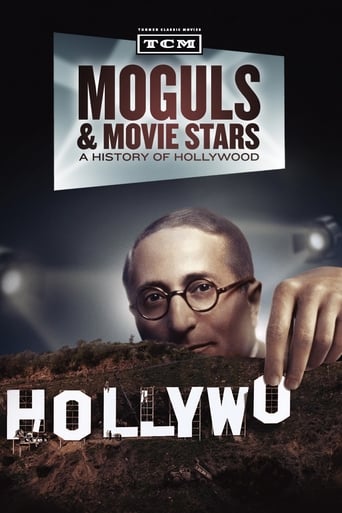John T. Ryan
WITH ALL OF the documentaries about movies that we've had compete for our attention during the years., one would think that all had been said and everything had been covered. Well, that's what we thought until in 2010, TURNER CLASSIC MOVIES aired this multi-episode gem.THOROUGH AND QUITE unpretentious, the series clearly rejects plush modern sets and high priced & well known on screen personalities; who are employed as "Host/Narrator." Instead, the series opts for solid research, the rarest of available surviving films, excellent writing and a very memorable original score on the soundtrack.AS FAR AS the Historical aspects, MOGULS & MOVIE STARS traces the origins of the Movies, not just to Edison or Lumierre, but deep into the 19th Century. It was during this period that we find some of Motion Picturs ancestors; prominent in this Genelogy is an invention known as "The Magic Lantern". Using powerful lights and a series of slides, it was among the Modern Wonders of the World.ONE ASPECT OF the story of Movies is covered quite well. That would be answering the question of just how did how did the phenomenon known as the Studios come into being? How did we wind up with such names as MGM, Warner Brothers, 20ty Century-Fox, Paramount, RKO, Universal, etc., become household words in just a few years? Moguls & Movie Stars does a fine job in shedding plenty of light in this area.WHEREAS PREVIOUS Documentaries have told of how motion picture came to be and how people would plunk down their hard earned nickels to watch short filmed records of a guy chopping wood, Batleships in Havana harbor or Cowboys and Indians of the contemporary West. MOGULS goes far beyond that; even to informing that the Movie Industry once rivaled that of Steel, Oil, Railroads and Automobile.TURNER CLASSIC MOVIES has rerun the series and most likely will again. It is also available on a set of DVD's for the home entertainment market. Either way, if you haven't seen it, do it. It is a great primer for the Movie Buff, The Serious Film Student or a Historian of the American Experience.
metalrox_2000
I should be clear that I am a film history buff, and i really thought I knew pretty much everything there was to know, until I saw Moguls and Movie stars.The documentary starts off in the penny arcades, where we are told that films are considered the entertainment choice of the poor and less educated. This quickly dismissed medium soon takes the world by storm.We then learn how powerful women where at the beginning stages of Hollywood, working as writers and directors, and producing some of the biggest films of the era. The documentary examines the pre-Hayes code films, and what Hollywood did to clean up its own image.Hollywood's handling of Hitler and World War II is told with amazing insight, and it contains a real eye opening story on how Casleblanca may never had been made if it weren't for Pearl Harbor.We then move on to the films of the 50's and 60's, and the story of James Dean is told. The series does end way too soon, as the 1970's, and the era of the cheap drive in flick don't get this stories told.Christopher Plummer is amazing as the narrator, and makes the entire series enjoyable. Hopefully, another installment will be produced, connecting a hundred plus years of Hollywood. This is a must series for not only the true film buff like myself, or the novice with a new interest in the history of Hollywood.
calvinnme
If you're coming to this seven part series expecting something like Brownlow's encyclopedic work "Hollywood" you'll be disappointed. This history really limits itself to the joint story of Hollywood and the moguls that formed and sustained the industry from the 1890's until the 1960's. The end of this period is marked by the retirement of Jack Warner, the last of the founding fathers of the industry and the last movie mogul.What may confuse some people is that the first episode of the series really concentrates on the beginning of the movies and what led up to the invention of the motion picture. The early moguls are mentioned but not stressed in this first episode as they are in all the others. Movie stars are mentioned throughout the series as are important directors, but ultimately it is the story of the men who founded the first motion picture studios and how they navigated an industry through the changing times and the first 80 years of film history.
boblipton
This series of documentary shows which has been running on the Turner Classic Movies cable station in the United States, gives a very good if standard view of the history of motion pictures -- anyone who has read a lot on the subject will find many 'facts' offered which he or she 'knows' to be false.Nonetheless, this is a very good introduction to the history of the movies and will give people just discovering old films a good idea of the general thrust of their evolution. Filled with sound bites from experts as well as clips and images, it shows, first that movies did no arise from nowhere, but grew out of half a millennium of technical evolution and the peculiar combination of events that led diverse people to become the leaders in what was the major entertainment industry for a good part of the 20th century.


